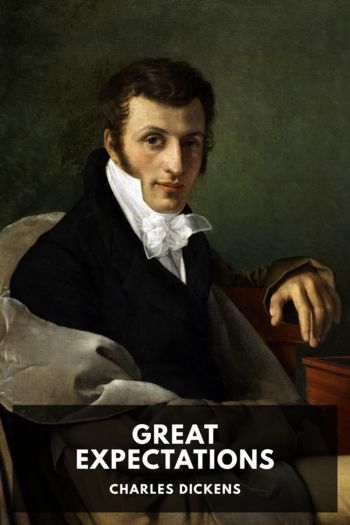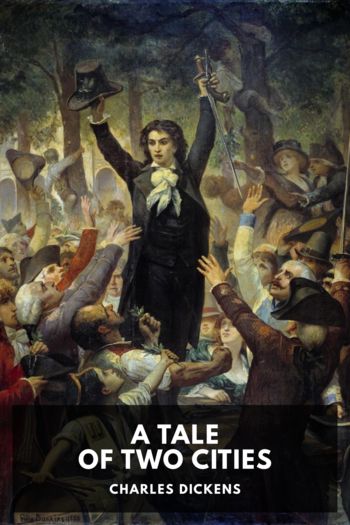Great Expectations by Charles Dickens (e textbook reader .txt) 📕

- Author: Charles Dickens
Book online «Great Expectations by Charles Dickens (e textbook reader .txt) 📕». Author Charles Dickens
“This is a banknote,” said I, “for five hundred pounds.”
“That is a banknote,” repeated Mr. Jaggers, “for five hundred pounds. And a very handsome sum of money too, I think. You consider it so?”
“How could I do otherwise!”
“Ah! But answer the question,” said Mr. Jaggers.
“Undoubtedly.”
“You consider it, undoubtedly, a handsome sum of money. Now, that handsome sum of money, Pip, is your own. It is a present to you on this day, in earnest of your expectations. And at the rate of that handsome sum of money per annum, and at no higher rate, you are to live until the donor of the whole appears. That is to say, you will now take your money affairs entirely into your own hands, and you will draw from Wemmick one hundred and twenty-five pounds per quarter, until you are in communication with the fountainhead, and no longer with the mere agent. As I have told you before, I am the mere agent. I execute my instructions, and I am paid for doing so. I think them injudicious, but I am not paid for giving any opinion on their merits.”
I was beginning to express my gratitude to my benefactor for the great liberality with which I was treated, when Mr. Jaggers stopped me. “I am not paid, Pip,” said he, coolly, “to carry your words to anyone;” and then gathered up his coattails, as he had gathered up the subject, and stood frowning at his boots as if he suspected them of designs against him.
After a pause, I hinted—
“There was a question just now, Mr. Jaggers, which you desired me to waive for a moment. I hope I am doing nothing wrong in asking it again?”
“What is it?” said he.
I might have known that he would never help me out; but it took me aback to have to shape the question afresh, as if it were quite new. “Is it likely,” I said, after hesitating, “that my patron, the fountainhead you have spoken of, Mr. Jaggers, will soon—” there I delicately stopped.
“Will soon what?” asked Mr. Jaggers. “That’s no question as it stands, you know.”
“Will soon come to London,” said I, after casting about for a precise form of words, “or summon me anywhere else?”
“Now, here,” replied Mr. Jaggers, fixing me for the first time with his dark deep-set eyes, “we must revert to the evening when we first encountered one another in your village. What did I tell you then, Pip?”
“You told me, Mr. Jaggers, that it might be years hence when that person appeared.”
“Just so,” said Mr. Jaggers, “that’s my answer.”
As we looked full at one another, I felt my breath come quicker in my strong desire to get something out of him. And as I felt that it came quicker, and as I felt that he saw that it came quicker, I felt that I had less chance than ever of getting anything out of him.
“Do you suppose it will still be years hence, Mr. Jaggers?”
Mr. Jaggers shook his head—not in negativing the question, but in altogether negativing the notion that he could anyhow be got to answer it—and the two horrible casts of the twitched faces looked, when my eyes strayed up to them, as if they had come to a crisis in their suspended attention, and were going to sneeze.
“Come!” said Mr. Jaggers, warming the backs of his legs with the backs of his warmed hands, “I’ll be plain with you, my friend Pip. That’s a question I must not be asked. You’ll understand that better, when I tell you it’s a question that might compromise me. Come! I’ll go a little further with you; I’ll say something more.”
He bent down so low to frown at his boots, that he was able to rub the calves of his legs in the pause he made.
“When that person discloses,” said Mr. Jaggers, straightening himself, “you and that person will settle your own affairs. When that person discloses, my part in this business will cease and determine. When that person discloses, it will not be necessary for me to know anything about it. And that’s all I have got to say.”
We looked at one another until I withdrew my eyes, and looked thoughtfully at the floor. From this last speech I derived the notion that Miss Havisham, for some reason or no reason, had not taken him into her confidence as to her designing me for Estella; that he resented this, and felt a jealousy about it; or that he really did object to that scheme, and would have nothing to do with it. When I raised my eyes again, I found that he had been shrewdly looking at me all the time, and was doing so still.
“If that is all you have to say, sir,” I remarked, “there can be nothing left for me to say.”
He nodded assent, and pulled out his thief-dreaded watch, and asked me where I was going to dine? I replied at my own chambers, with Herbert. As a necessary sequence, I asked him if he would favor us with his company, and he promptly accepted the invitation. But he insisted on walking home with me, in order that I might make no extra preparation for him, and first he had a letter or two to write, and (of course) had his hands to wash. So I said I would go into the outer office and talk to Wemmick.
The fact was, that when the five hundred pounds had come into my pocket, a thought had come into my head which had been often there before; and it appeared to me that Wemmick was a good person to advise with concerning such thought.
He had already locked up his safe, and made preparations for going home. He had left his desk, brought out his two greasy office candlesticks and stood them in line with the snuffers on a slab near the door, ready to be





Comments (0)